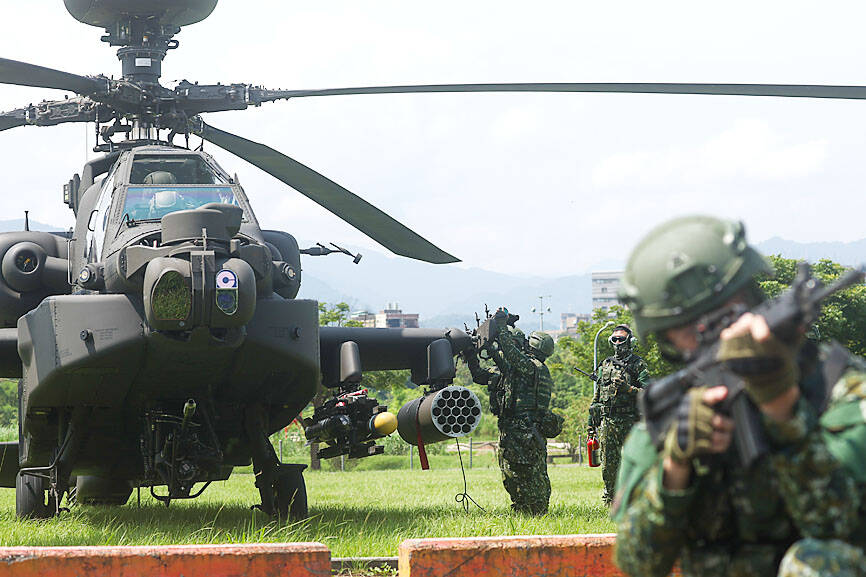The Executive Yuan’s defense budget plan for fiscal 2026 would reach 3 percent of GDP, sources familiar with the matter said yesterday.
The Cabinet has prepared a proposal allocating about NT$800 billion (US$26.66 billion) for defense, which would exceed the 3 percent target once defense-related special budgets are included, the sources said.
This year, Taiwan spent NT$467.5 billion on defense, or 2.45 percent of GDP, including mandatory spending and special budgets.

Photo: CNA
Premier Cho Jung-tai (卓榮泰) on Thursday presented a draft of the budget to President William Lai (賴清德) and is to deliver a finalized version later this week, the sources said.
The Executive Yuan is expected to approve the proposal on Thursday before sending it to the legislature for review.
The Ministry of National Defense (MND) would receive NT$500 billion, making it the only ministry to see an increase in funding, while other ministries would enact measures to ensure zero budget growth, they said.
The increase in defense spending includes allocations for MND programs to expand the proportion of volunteer service members and to boost bonus pay for personnel serving in combat units, they said.
Amendments to the Pay Act of the Armed Forces (軍人待遇條例) — passed by the legislature in June mandating increases in military pay and allowances — are not reflected in the MND’s budget plan, as the Cabinet might still challenge the legislation in the Constitutional Court, the sources said.
The budget plan also earmarks NT$69.1 billion for the New Fighter Acquisition Program and the Air and Sea Combat Power Improvement Program, in addition to the MND’s main allocation, they said.
The budget would also allocate NT$115 billion for national resilience, along with smaller sums for other miscellaneous projects, they added.
Using NATO’s formula for calculating defense spending, which counts coast guard budgets and veterans’ pension funds, Taiwan’s military expenditures would exceed the 3 percent target, they said.
The plan to increase defense spending follows comments made by US President Donald Trump during his presidential campaign last year that Taiwan should spend about 10 percent of GDP on its armed forces and pay the US for protection against China.
Under former president Tsai Ing-wen (蔡英文), the defense budget grew steadily from NT$365.8 billion in 2016 to NT$606.8 billion last year.
However, the budget still fell short of the 3 percent of GDP target she had pledged.
US Undersecretary of Defense for Policy Elbridge Colby echoed Trump’s criticism during his US Senate confirmation hearing in March, saying that Taiwan’s defense spending remained insufficient to meet the threat posed by China.
“As a proportion of GDP, it’s well below 3 percent,” Colby said on March 4. “I agree with President Trump that they should be more like 10 percent or at least something in that ballpark, really focused on their defense.”
Cho on March 12 said that Taiwan does “not have the capacity” to spend 10 percent of its GDP annually on defense.
Additional reporting by agencies

MAKING WAVES: China’s maritime militia could become a nontraditional threat in war, clogging up shipping lanes to prevent US or Japanese intervention, a report said About 1,900 Chinese ships flying flags of convenience and fishing vessels that participated in China’s military exercises around Taiwan last month and in January have been listed for monitoring, Coast Guard Administration (CGA) Deputy Director-General Hsieh Ching-chin (謝慶欽) said yesterday. Following amendments to the Commercial Port Act (商港法) and the Law of Ships (船舶法) last month, the CGA can designate possible berthing areas or deny ports of call for vessels suspected of loitering around areas where undersea cables can be accessed, Oceans Affairs Council Minister Kuan Bi-ling (管碧玲) said. The list of suspected ships, originally 300, had risen to about 1,900 as

DAREDEVIL: Honnold said it had always been a dream of his to climb Taipei 101, while a Netflix producer said the skyscraper was ‘a real icon of this country’ US climber Alex Honnold yesterday took on Taiwan’s tallest building, becoming the first person to scale Taipei 101 without a rope, harness or safety net. Hundreds of spectators gathered at the base of the 101-story skyscraper to watch Honnold, 40, embark on his daredevil feat, which was also broadcast live on Netflix. Dressed in a red T-shirt and yellow custom-made climbing shoes, Honnold swiftly moved up the southeast face of the glass and steel building. At one point, he stepped onto a platform midway up to wave down at fans and onlookers who were taking photos. People watching from inside

Japan’s strategic alliance with the US would collapse if Tokyo were to turn away from a conflict in Taiwan, Japanese Prime Minister Sanae Takaichi said yesterday, but distanced herself from previous comments that suggested a possible military response in such an event. Takaichi expressed her latest views on a nationally broadcast TV program late on Monday, where an opposition party leader criticized her for igniting tensions with China with the earlier remarks. Ties between Japan and China have sunk to the worst level in years after Takaichi said in November that a hypothetical Chinese attack on Taiwan could bring about a Japanese

The WHO ignored early COVID-19 warnings from Taiwan, US Deputy Secretary of Health and Human Services Jim O’Neill said on Friday, as part of justification for Washington withdrawing from the global health body. US Secretary of State Marco Rubio on Thursday said that the US was pulling out of the UN agency, as it failed to fulfill its responsibilities during the COVID-19 pandemic. The WHO “ignored early COVID warnings from Taiwan in 2019 by pretending Taiwan did not exist, O’Neill wrote on X on Friday, Taiwan time. “It ignored rigorous science and promoted lockdowns.” The US will “continue international coordination on infectious